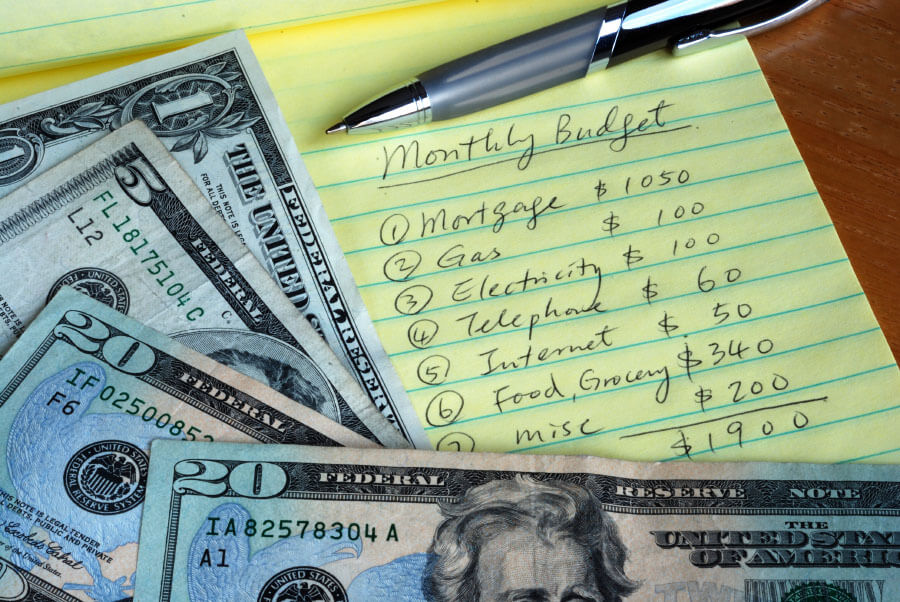Have you ever felt like it’s tough to get ahead when prices keep going up on the things you buy every day? You’re certainly not alone, given the high cost of living that seems to only be getting higher. Taking a few basic steps to save money here and there can help you regain a little control.
To manage higher living expenses, you may be able to pick up some extra hours at work or work your way into a higher-paying position. This kind of initiative can boost your paycheck and can help you in the long run. But when extra hours or advancement are not an immediate option, there are still ways to stay ahead.
So take a deep breath and get ready to learn about the many ways to put extra money in the bank when times are tough. All you have to do is set a budget and then try out some of these tips to save on groceries, utilities, gas, entertainment, and more.
Set a budget
To get through tough times, the first step is to take an honest look at your current finances, including your income and monthly expenses. Then set a realistic budget based on current prices.
One way to set a budget is to follow the 60/20/20 rule. In that scenario, 60% of your paycheck goes towards your living expenses, including necessities like rent, food, utilities, and transportation. Then you put 20% towards saving (open a savings account!) or any outstanding debt, while the remaining 20% goes to personal spending.
If you receive a windfall that’s not in your budget, like a bonus or tax refund – pay down that debt first or put it in savings. The goal is to eventually give yourself a cushion of $500 or more, depending on your financial situation. That way, if an unexpected expense does come along, you won’t have to resort to borrowing from friends, charging necessities on a credit card–or worse–a high-interest rate payday loan.

Reduce your food and grocery budget
If you’re noticing higher prices in the grocery store aisles, you’re probably already motivated to make some changes. Food is a necessity, but it’s one of those budget categories you may be able to whittle down with a few budget tips, even as prices go up.
Meal planning to save money
Meal planning is one of the best ways to trim your food budget and still eat well. By sitting down at the beginning of the week and planning out your meals, you’ll reduce your shopping runs. If ground beef is on sale this week, take advantage of it! When you plan ahead, you can also think of more appealing ways to use any leftovers and eliminate waste.
Buy bulk and save – but only if you know you’ll use it!
You may find that places like Sam’s Club offer savings on staples that you know you’ll eventually use, like rice and canned goods. It’s important to know the regular price of your pantry items before you go, though, so you don’t end up paying more than you would in your regular grocery store run. Also be wary of produce, because if you don’t end up eating every orange in the 10-lb bag, it could end up costing you more.
Buy less and save – so you don’t end up paying for something you threw out
Try to stick to your list and avoid impulse buys when you’re shopping. You’ll end up saving money and you’re less likely to buy some expensive snack item.
Eating at home
One of the most effective ways to save is to avoid eating out in restaurants. Even if you’re not much of a cook, eating at home as much as you can keeps you from spending extra money when you don’t have to.
Coupons – at the grocery store and eating out
Developing a coupon habit will help you save more in restaurants and at the grocery store. When you set your budget, plan it so you can still eat out on occasion, and use coupons when you do. Coupons are still a thing in grocery stores, and you just have to join the loyalty program for whatever stores you shop at the most. And remember to clip the coupons digitally before you shop.
Save money on gas
Pain at the pump has hit everyone these days. It’s gotten a lot more expensive just to drive to and from work. Since every gas station sells pretty much the same gas, why pay more than you need to? There are a few tried and true ways to keep some of your hard-earned money in your pocket.
Driving Habits
We’ve all seen the guy who floors it as soon as the light turns green, only to brake hard and idle at the next stop light. If you want to save your paycheck, alter your driving habits to slow down and avoid idling as much as you can.
GasBuddy
The GasBuddy app is the best-known app to help you find the cheapest gas near you at any given time. Then head to one of the lower-priced stations near you to buy your gas. Because it is widely used by so many people, gas price data stays reliably up to date and you can see when prices are going up.
Carpool
If you drive quite a distance to get to work and back every day, carpooling with someone who lives near the same carpool lot that you do might make a lot of sense to make ends meet. When there are errands to run on specific days, carpooling 3 out of 5 days a week can still save money. Ask around at work and see if something can be arranged. You will both benefit.
Clubs
Wholesale clubs like Costco and Sam’s Club have busy gas stations for a reason. Costco is sometimes up to 20 cents less per gallon than nearby stations, and if you use the right membership card, you also get 4% back on every gallon.
Membership Loyalty Cards
Whichever station you frequent, take the time to get a membership card. Some memberships require a credit card, but some only require you to join to get savings on gas and other sundries.

Save on utilities
When prices are on the rise, heat, and electricity bills take a bigger bite out of each month’s budget. Make sure you’re not paying more than you need to by checking out ways to decrease these expenses.
Energy Audits
Consumers Energy offers a program to provide a free home energy analysis to identify ways to reduce your energy use. Depending on whether you get both gas and electricity or just electricity from Consumers Energy, you may be eligible for free upgrades like pipe insulation and a programmable thermostat. Contact Consumers Energy for more information about the program.
Even if you’re a renter, states such as Michigan have weatherization programs that assist residents who qualify. The weatherization program at Kent County Community Action will add insulation or seal cracks as needed to make your home cozier and reduce your monthly bills.
Energy Reduction
You can find several ways to reduce your energy usage even if you don’t have an official energy audit.
- Keep cold air out in the winter and do the opposite in summer. That means sealing all the leaks you can around windows and doors with a cheap tube of caulk or weather stripping from the hardware store.
- Try to use fans so you don’t have to cool your whole house. If you’re home by yourself, aiming a personal fan at your face can do a lot to stay comfortable and prevent turning up the A/C in the summer.
- Since summer utilities cost more between 2 p.m. and 7 p.m., try to avoid running an electric dryer or a dehumidifier in the basement during those times. Some people pre-cool their homes before 2 pm and then turn down their A/C during those hours. Or for as long as they can feel comfortable anyway.
- Use LED light bulbs to save electricity. Especially if you have kids (or adult kids) who always forget to turn off the light. The amount of electricity from standard bulbs adds up. Experience how much nicer it is to use your savings on electricity and spend it on something you appreciate.
Consumers Energy provides energy-saving tips to help you avoid paying more than you need to.
Renegotiate your bills
Since you’re setting a budget anyway, take a hard look at any monthly bills you have – utilities, cable, phone, insurance, credit cards. See if you might be able to cut back on any of them. Your phone plan, cable, and internet may be cheaper than those of other providers. If you purchase these services on a 1-year discounted plan, call the company after the year is up to re-negotiate the rate. They don’t want you to go elsewhere and most are more than willing to find another discount rate available at that time. For cable TV, consider getting a good antenna or “cut the cord” if you haven’t already.
You also may be able to renegotiate insurance rates for your car, homeowners, or renters insurance. It pays to shop around, or bundle policies with the same company for a better rate.
Sell things you don’t need
Most of us have things lying around that we don’t need, so why not add to your income and get rid of some clutter at the same time? Sell your extra items using Facebook Marketplace, eBay, Craigslist, or a yard sale. Profit from your children’s outgrown clothes and furniture, old books, computers, jewelry, cell phones, and hobby equipment you no longer use.
Pay less for entertainment
Ticket prices may be on the rise, but we still need to have some fun! You may want to splurge once in a while, and there are plenty of low-cost and free ways to have fun too. Whether it’s meeting up with friends at home for coffee or to watch the game, you can find lots of alternatives to socialize without spending money. You may even be able to reduce your monthly expenses by canceling subscriptions to Netflix or other services and sticking to the shows that are free on TV. With a free library card, you can also get free access to events around the community, from zoos to museums to theater performances.
Use apps to save money
Mobile apps like Ibotta will let you earn money every time you shop. All you have to do is sign up and perform a few steps before and after your shopping trip: Plan your shopping list in the Ibotta app, upload a picture of the receipt when you’re done shopping, and scan the barcodes of the items you purchased. You’ll have a nice little side hustle that earns money doing something you probably do every week anyway.
It’s possible to stay afloat even when the cost of living is going up. Sticking to a budget can help get you through the lean times and set you up for a bright future. Before you know it, you’re an expert on saving money.


